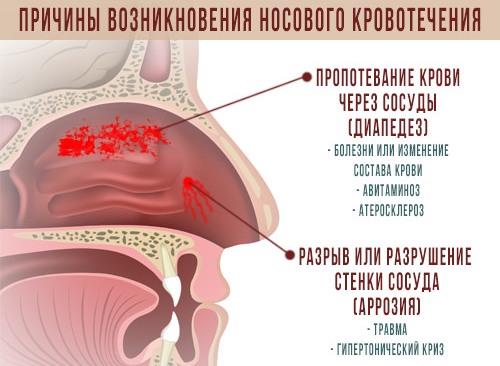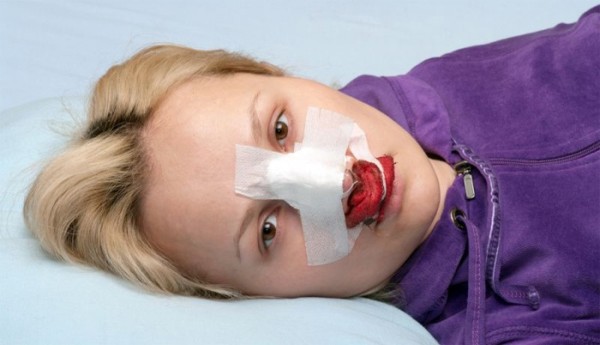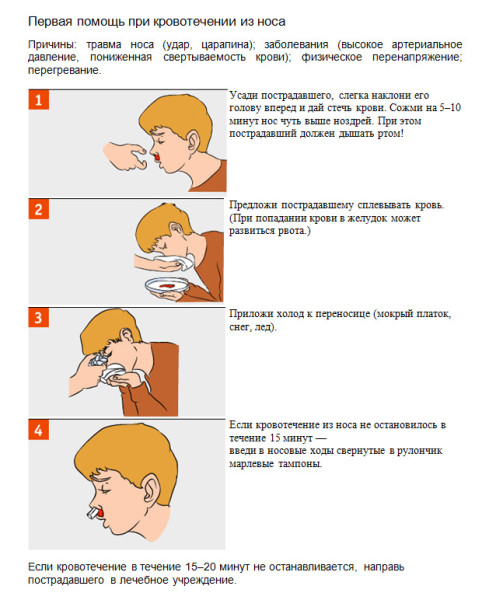Why does nose bleed
Hardly every person has come across in life such a phenomenon as nosebleeds. This frightens some, all the more unpleasant if the incident occurred in a public place or at work, it happens that after bleeding in the nasal cavity, dryness is felt, less often a burning sensation. The reasons can be completely different, so it is necessary to understand the factors affecting nosebleeds and its health consequences.
Content
Why does nose bleed
First, observe the nature of the nosebleeds. Is it tied to a specific time of day? Is the discharge abundant or scarce? Are there any clots? When do they appear - in the morning or in the late afternoon? On the basis of these data, one can independently assume the reason, but, in any case, it is worth contacting an ENT specialist and a local therapist, undergoing an examination and being tested.
The problem can be local in nature - sometimes blood flows due to vascular damage, trauma, or inaccurate nose picking.
There are a number of relatively harmless causes of bleeding, mainly associated with exposure to external conditions:
- Often, the appearance of blood is provoked by injuries to the facial bones of the skull. Blows and fractures of the nasal septum inevitably cause severe bleeding.
- Sudden changes in temperature, sunstroke, stress and physical activity is the cause of one-time bleeding.
- In winter, the fragility of the vessels is due to the drying out of the mucous membrane of the nasopharynx.

Why does a child have nosebleeds?
Surely, all mothers will agree that the mere sight of the blood of her beloved child causes shock and panic. In fact, the causes of this phenomenon, called epistaxis in medicine, do not always have dire consequences. The explanation can be completely banal, so when you see drops of blood on the child's things, first of all, pull yourself together, provide first aid, and then seek the advice of a therapist.
Because of a single nosebleed, parents do not need to worry and sound the alarm at all, it is another matter if this is repeated at intervals at least once a month.
The main factors signaling health problems in children of different ages:
- Particular attention should be paid to nosebleeds in newborns. Perhaps the reason is trauma to the mucous membrane after cleansing the nose, too dry air in the room and overheating, which is so abused by young parents. The thin capillaries most often burst when sneezing or coughing. If you observe regular and profuse blood loss, then this is a serious reason to undergo a full examination, the baby may be diagnosed with anemia, hemophilia, problems with the heart and blood vessels, ulcers and formations inside the nasal passage.
- In children from 2 to 10 years old, the appearance of nosebleeds is associated with an increase in physical activity and may indicate the presence of falls and injuries, heat, sunstroke, overheating, changes in blood pressure during outdoor games, foreign objects (toys, beads) entering the nasopharynx , hypertension, inflammatory processes in the nasal cavity (sinusitis, sinusitis), viral diseases th, frequent use of vasoconstrictor drugs for the common cold, lack of vitamin C, which is responsible for the health of capillaries, hereditary diseases.
- In adolescence, a powerful growth spurt occurs, hormonal surges cause periodic nosebleeds, they usually stop with the end of puberty. Vegeto-vascular dystonia often makes itself felt precisely in the period from 10 to 14 years old, dizziness, headaches, sweating, and increased heart rate also become signs of pathology.

Nosebleed at night
Epistaxis is a pathological condition when blood, under the influence of pressure, goes beyond the vessels into the internal organs or outward. It is likely that this can happen at night, this phenomenon is a greater danger than the appearance of blood during the day, since if necessary, there may be no one nearby to provide first aid.
Factors affecting the appearance of bleeding at night can be trauma to the walls of blood vessels - during sleep, we involuntarily scratch our nose, using more force than necessary. Damage to the capillaries also occurs when coughing and sneezing.
Particular attention should be paid to how exactly the blood comes out of the nose. If it flows out in a thin stream or small blood clots, then this is the so-called anterior bleeding, it does not pose the slightest threat to health.
When the blood has a bright scarlet color and at the same time the pressure is quite intense, there is a possibility that the arteries of the posterior nasal septum are damaged. This symptom is very alarming, because large blood loss is fatal if not stopped in time. 
Blood from the nose during pregnancy
Pregnancy is a period in a woman's life when there is a complete restructuring of the hormonal background. Most expectant mothers do not perceive nosebleeds as something that threatens their health and the life of the baby. An increase in the level of estrogen and progesterone leads to abundant filling of blood vessels, the mucous membrane becomes loose and dries up quickly, which leads to their trauma. There are other provoking factors, basically the same ones that arise in the normal state.
Measures to prevent nosebleeds:
- Ventilate the room as often as possible so that the air is sufficiently humid.
- Observe the drinking regime — the norm necessary for a person is about two liters per day.
- Do not use remedies for rhinitis and congestion without great need and a doctor's recommendation. You also need to blow your nose carefully so as not to damage the walls of blood vessels.
- Avoid breathing harmful chemicals or cigarette smoke.
- Stay outdoors more often.
- Moisturize the nasal mucosa with sea water or special sprays.

Blood clots from the nose
Sometimes during viral and infectious diseases, some patients experience the appearance of blood clots from the nose, which, together with mucus, seep through the fragile walls of the capillaries.
Worse if nosebleeds appear without any accompanying symptoms, temperature, intoxication, malaise. Then this indicates the development of pathologies of the nasal cavity, nasal septum or internal organs. Regular clotting may indicate a weakened immune system and blood disorders.
To identify the true cause, it is necessary to consult a doctor who will perform an external examination of the nasal cavity, nasopharynx and pharynx. Sometimes it is necessary to identify nosebleeds caused by internal bleeding of organs - the stomach, lungs and esophagus. In this situation, fluid enters the nose and then flows out of it. 
There is often nosebleeds
There are causes of frequent nosebleeds, which are not an independent pathological process, but symptoms of systemic disorders, mainly associated with the functioning of the respiratory system, heart and blood vessels.
- One of the most common causes of nosebleeds is increased blood pressure, whether arterial or intracranial. The fact is that everything happens because of the high blood pressure acting on the thin walls of the vessels, as a result of which the capillaries do not withstand and rupture. Most often this process occurs in the morning - from 4 to 7 in the morning.
- Diseases such as vegetative-vascular dystonia, heart disease, atherosclerosis are also accompanied by nosebleeds due to fragility and thinned vessel walls.
- Inflammatory processes in the nasal cavity (sinusitis, rhinitis, sinusitis) are accompanied by an increase in pressure on the capillaries. The situation can be aggravated by concomitant ailments - ARVI, influenza, bacterial infections.
- Polyps are benign neoplasms that grow in the nasal cavity and make breathing difficult, causing frequent bleeding. The same applies to malignant tumors and ulcers.
- Uncontrolled intake of certain medicines and sprays for the common cold, provokes drying of the mucous membrane and thinning of the walls of blood vessels.
- Certain diseases associated with bleeding disorders, such as hemophilia.
- Heredity.

How to stop nosebleeds
If a nosebleed catches you by surprise, the following tips may help you: first aid:
- If the child needs to stop the bleeding, first calm him down and make sure that no foreign object gets into his nose.
- Then sit the victim so that the head is slightly thrown back, but not completely, then the liquid will not drain down the throat. If blood does get into the throat, it should be spit out so as not to provoke a cough. It is also impossible to bend down intensively, this will further increase the blood flow.
- If the person begins to faint, lay the person on a flat surface with their head slightly to one side, and then immediately call an ambulance.
- Apply ice or a cloth soaked in cold water to the bridge of the nose to stop bleeding, and do not allow the patient to blow their nose.
- If the blood flow is not strong, the following advice may help you - tilt your head and slightly press the wings of your nose for 10 minutes.


